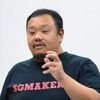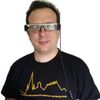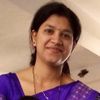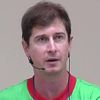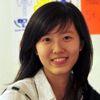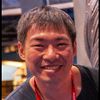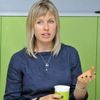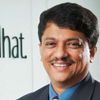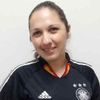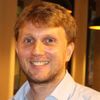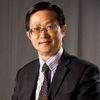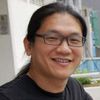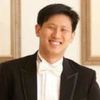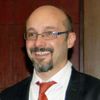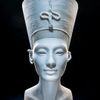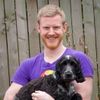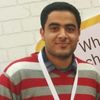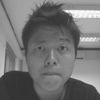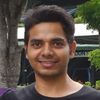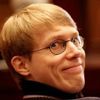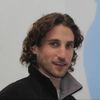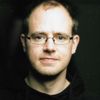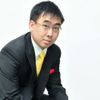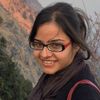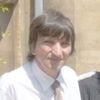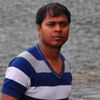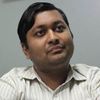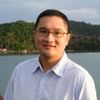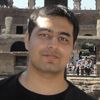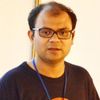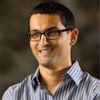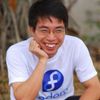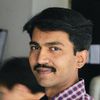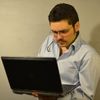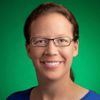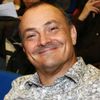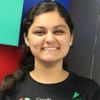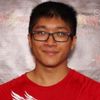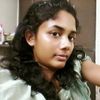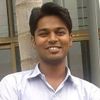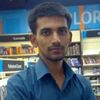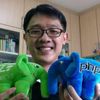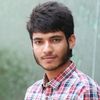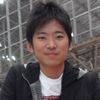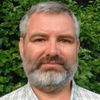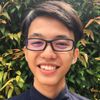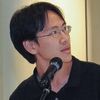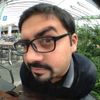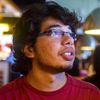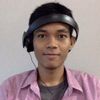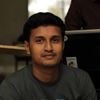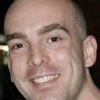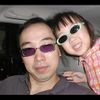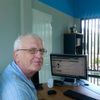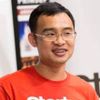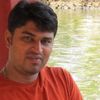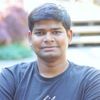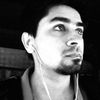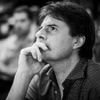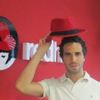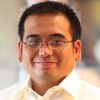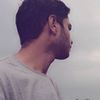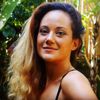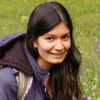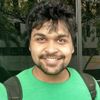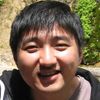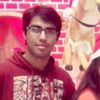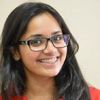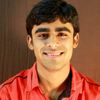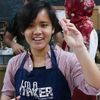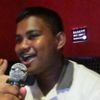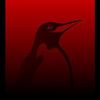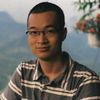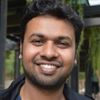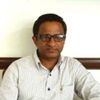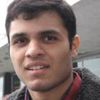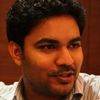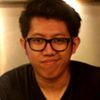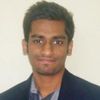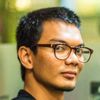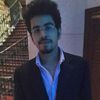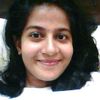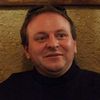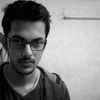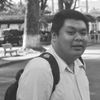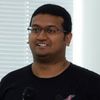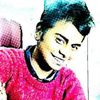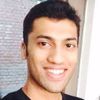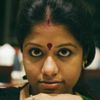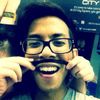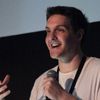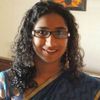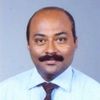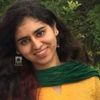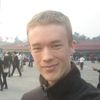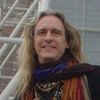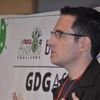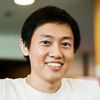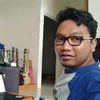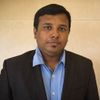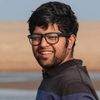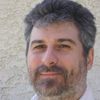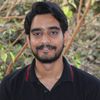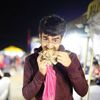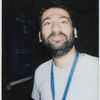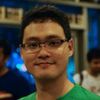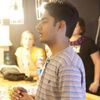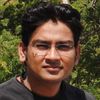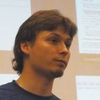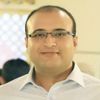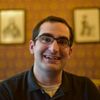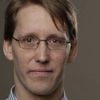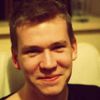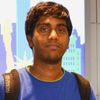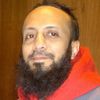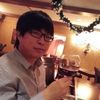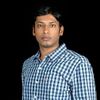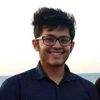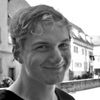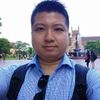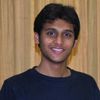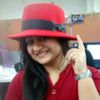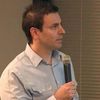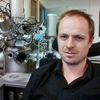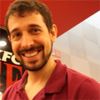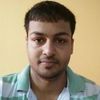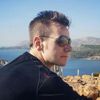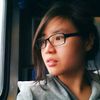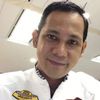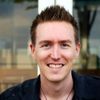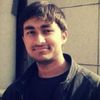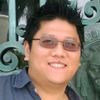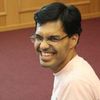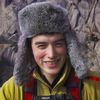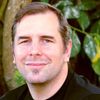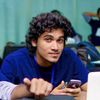Schedule
Friday, 18th Mar
ChorusText open assistive device![]()
David Effendi ( ChorusText)
Exhibition Area
- David Effendi ( ChorusText)
- Exhibition Area
Ground Floor, Scientist For a day, Hall A
Friday, 18th Mar, 09:00 - 09:30
- Exhibition
ESPresso Lite![]()
![]()
William Hooi ( ESPert), Ulrich Norbisrath ( ulno.net)
Exhibition Area
- William Hooi ( ESPert), Ulrich Norbisrath ( ulno.net)
- Exhibition Area
Ground Floor, Scientist For a day, Hall A
Friday, 18th Mar, 09:00 - 09:30
- Exhibition
Science Hacks with PSL@Fossasia![]()
Minal Patil ( ExpEYES)
Exhibition Area
- Minal Patil ( ExpEYES)
- Exhibition Area
Ground Floor, Scientist For a day, Hall A
Friday, 18th Mar, 09:00 - 09:30
- Exhibition
Free Real-time communications lounge![]()
Daniel Pocock ( Debian)
Exhibition Area
- Daniel Pocock ( Debian)
- Exhibition Area
Ground Floor, Scientist For a day, Hall A
Friday, 18th Mar, 09:00 - 09:30
- Exhibition
Ring a decentralized and secure communication platform![]()
Alexandre Lision ( Ring developped by Savoir-faire Linux)
Exhibition Area
- Alexandre Lision ( Ring developped by Savoir-faire Linux)
- Exhibition Area
Ground Floor, Scientist For a day, Hall A
Friday, 18th Mar, 09:00 - 09:30
- Exhibition
FOSSASIA![]()
Hong Phuc Dang ( FOSSASIA)
Exhibition Area
- Hong Phuc Dang ( FOSSASIA)
- Exhibition Area
Ground Floor, Scientist For a day, Hall A
Friday, 18th Mar, 09:00 - 09:30
- Exhibition
Deepin Desktop System Demo![]()
Derek Dai ( Deepin)
Exhibition Area
- Derek Dai ( Deepin)
- Exhibition Area
Ground Floor, Scientist For a day, Hall A
Friday, 18th Mar, 09:00 - 09:30
- Exhibition
Developers looking for designers? Show off your project!![]()
Victoria Bondarchuk ( Seoul Tech Society, Dmajor)
Job board in person
- Victoria Bondarchuk ( Seoul Tech Society, Dmajor)
- Job board in person
Ground Floor, Scientist For a day, Hall A
Friday, 18th Mar, 09:00 - 09:30
- Exhibition
coala
Ankit Verma ( coala)
Exhibition Area
![]()
- Ankit Verma ( coala)
- Exhibition Area
Ground Floor, Scientist For a day, Hall A
Friday, 18th Mar, 09:00 - 09:30
- Exhibition
RedHat![]()
Harish Pillay ( RedHat)
Exhibition Area
- Harish Pillay ( RedHat)
- Exhibition Area
Ground Floor, Scientist For a day, Hall A
Friday, 18th Mar, 09:00 - 09:30
- Exhibition
MySQL![]()
Ricky Setyawan ( MySQL)
Exhibition Area
- Ricky Setyawan ( MySQL)
- Exhibition Area
Ground Floor, Scientist For a day, Hall A
Friday, 18th Mar, 09:00 - 09:30
- Exhibition
UNESCO YouthMobile![]()
Misako Ito ( UNESCO)
Exhibition Area
- Misako Ito ( UNESCO)
- Exhibition Area
Ground Floor, Scientist For a day, Hall A
Friday, 18th Mar, 09:00 - 09:30
- Exhibition
Creative Confidence![]()
Elda Webb ( One Maker Group)
Exhibition Area
- Elda Webb ( One Maker Group)
- Exhibition Area
Ground Floor, Scientist For a day, Hall A
Friday, 18th Mar, 09:00 - 09:30
- Exhibition
Enriching Student Experience
Peter LIM ( Nanyang Polytechnic)
Exhibition Area
![]()
- Peter LIM ( Nanyang Polytechnic)
- Exhibition Area
Ground Floor, Scientist For a day, Hall A
Friday, 18th Mar, 09:00 - 09:30
- Exhibition
Master of Science Technopreneurship & Innovation Programme (MSc TIP)
Claire Tan ( NTU Nanyang Technopreneruship Center)
Exhibition Area
![]()
- Claire Tan ( NTU Nanyang Technopreneruship Center)
- Exhibition Area
Ground Floor, Scientist For a day, Hall A
Friday, 18th Mar, 09:00 - 09:30
- Exhibition
Grand Opening![]()
Hong Phuc Dang ( FOSSASIA)
Welcome
- Hong Phuc Dang ( FOSSASIA)
- Welcome
Dalton Hall
Friday, 18th Mar, 09:30 - 10:00
- OpenTech and IoT
The story of FOSSASIA 2016, The Internet of Things and Me![]()
Mario Behling ( OpenTech Society)
Program Overview
- Mario Behling ( OpenTech Society)
- Program Overview
Dalton Hall
Friday, 18th Mar, 09:35 - 10:05
- OpenTech and IoT
Welcome at the Centre of Science Education in Singapore![]()
Lim Tit Meng ( Science Centre Singapore)
Host Welcome
- Lim Tit Meng ( Science Centre Singapore)
- Host Welcome
Dalton Hall
Friday, 18th Mar, 09:45 - 10:15
- OpenTech and IoT
A Funny Thing Happened On My Way To The Science Centre![]()
Harish Pillay ( RedHat)
Keynote of 20 minutes
- Harish Pillay ( RedHat)
- Keynote of 20 minutes
Dalton Hall
Friday, 18th Mar, 09:55 - 10:25
- OpenTech and IoT
Sex, Circuits, and Deep House![]()
Bunnie Huang ( Sutajio Ko-Usagi PTE LTD)
Talk of 20 minutes
- Bunnie Huang ( Sutajio Ko-Usagi PTE LTD)
- Talk of 20 minutes
Dalton Hall
Friday, 18th Mar, 10:20 - 10:50
- OpenTech and IoT
Rethinking Drone Delivery with Open Source![]()
Bernard Leong ( Singapore Post)
Talk of 20 minutes
- Bernard Leong ( Singapore Post)
- Talk of 20 minutes
Dalton Hall
Friday, 18th Mar, 10:40 - 11:10
- OpenTech and IoT
UNESCO YouthMobile![]()
Davide Storti ( UNESCO)
Keynote of 20 minutes
- Davide Storti ( UNESCO)
- Keynote of 20 minutes
Dalton Hall
Friday, 18th Mar, 11:15 - 11:45
- OpenTech and IoT
Science and Open Source Program at Google![]()
Cat Allman ( Google)
Keynote of 20 minutes
- Cat Allman ( Google)
- Keynote of 20 minutes
Dalton Hall
Friday, 18th Mar, 11:35 - 12:05
- OpenTech and IoT
#NefertitiHack and Cultural Commons "The Other Nefertiti"![]()
Jan Nikolai Nelles ( Artist of "The Other Nefertiti")
Talk of 20 minutes
- Jan Nikolai Nelles ( Artist of "The Other Nefertiti")
- Talk of 20 minutes
Dalton Hall
Friday, 18th Mar, 11:55 - 12:25
- OpenTech and IoT
Managing A Healthy GitHub Community![]()
Mike McQuaid ( GitHub/Homebrew)
Talk of 20 minutes
- Mike McQuaid ( GitHub/Homebrew)
- Talk of 20 minutes
Dalton Hall
Friday, 18th Mar, 13:30 - 14:00
- OpenTech and IoT
Mobile development for students![]()
Manan Wason ( IIIT Delhi)
Workshop of 2 hours
- Manan Wason ( IIIT Delhi)
- Workshop of 2 hours
Digital Design Studio
Friday, 18th Mar, 13:30 - 14:00
- Tech Kids I
Design Making Program![]()
Jamen Loh ( OneMaker Group)
Workshop of 2 hours
- Jamen Loh ( OneMaker Group)
- Workshop of 2 hours
Digital Design Studio
Friday, 18th Mar, 13:30 - 14:00
- Tech Kids II
Ambient Dynamix: Adaptive gateway to IoT![]()
Shivam Verma ( Ambient Dynamix/National University of Singapore)
Talk of 20 minutes
- Shivam Verma ( Ambient Dynamix/National University of Singapore)
- Talk of 20 minutes
Eco Garden Lab
Friday, 18th Mar, 13:30 - 14:00
- Hardware and IoT
Technologies developed by Red Hat![]()
Harish Pillay ( RedHat)
Talk of 20 minutes
- Harish Pillay ( RedHat)
- Talk of 20 minutes
Planck Lab
Friday, 18th Mar, 13:30 - 14:00
- DevOps
opendetection.com![]()
Marco A. Gutiérrez ( Robolab, University of Extremadura, Spain)
Talk of 60 minutes
- Marco A. Gutiérrez ( Robolab, University of Extremadura, Spain)
- Talk of 60 minutes
Fermi Lab
Friday, 18th Mar, 13:30 - 14:00
- Big Data/Open Data
Why are we (Still) wasting food? How technology can help![]()
Maxime Pourrat ( Winnow Solutions)
Talk of 20 minutes
- Maxime Pourrat ( Winnow Solutions)
- Talk of 20 minutes
Einstein Room
Friday, 18th Mar, 13:30 - 14:00
- Internet, Society, Community
What's new in systemd in 2016?![]()
Lennart Poettering ( Red Hat)
Talk of 20 minutes
- Lennart Poettering ( Red Hat)
- Talk of 20 minutes
Dalton Hall
Friday, 18th Mar, 14:00 - 14:30
- OpenTech and IoT
Open Source Drones![]()
Jiin Joo Ong ( Garuda Robotics)
Workshop of 1 hour
- Jiin Joo Ong ( Garuda Robotics)
- Workshop of 1 hour
Eco Garden Lab
Friday, 18th Mar, 14:00 - 14:30
- Hardware and IoT
oVirt Integration With Foreman And Katello - Bringing Your Virtualized Data-Center Into The Next Level![]()
Yaniv Bronhaim ( Red Hat)
Talk of 20 minutes
- Yaniv Bronhaim ( Red Hat)
- Talk of 20 minutes
Planck Lab
Friday, 18th Mar, 14:00 - 14:30
- DevOps
The Smart City - Where mammals and computers live together in mutually programming harmony like pure water touching clear sky![]()
Herr Flupke ( ð°)
Talk of 20 minutes
- Herr Flupke ( ð°)
- Talk of 20 minutes
Einstein Room
Friday, 18th Mar, 14:00 - 14:30
- Internet, Society, Community
Legalese.io: smart contracts, dumb lawyers, and you![]()
Meng Weng Wong ( Legalese.io)
Talk of 20 minutes
- Meng Weng Wong ( Legalese.io)
- Talk of 20 minutes
Dalton Hall
Friday, 18th Mar, 14:30 - 15:00
- OpenTech and IoT
Comparing virtualization and containers
Amit Shah ( Red Hat)
Talk of 20 minutes
![]()
- Amit Shah ( Red Hat)
- Talk of 20 minutes
Planck Lab
Friday, 18th Mar, 14:30 - 15:00
- DevOps
Collaborative Spelling Dictionary![]()
Ankita Shukla ( IIT Roorkee)
Talk of 20 minutes
- Ankita Shukla ( IIT Roorkee)
- Talk of 20 minutes
Fermi Lab
Friday, 18th Mar, 14:30 - 15:00
- Big Data/Open Data
Who owns my notebook? or why I want to run coreboot on every device
Alexander Couzens ( freelancer)
Talk of 20 minutes
![]()
- Alexander Couzens ( freelancer)
- Talk of 20 minutes
Einstein Room
Friday, 18th Mar, 14:30 - 15:00
- Internet, Society, Community
BBC micro:bit - Next generation teaching tools![]()
David Crellin ( ScienceScope Ltd)
Talk of 20 minutes
- David Crellin ( ScienceScope Ltd)
- Talk of 20 minutes
Dalton Hall
Friday, 18th Mar, 14:55 - 15:25
- OpenTech and IoT
Unleash the potential of NVDIMM Namespaces![]()
Parmeshwr Prasad ( dell)
Talk of 20 minutes
- Parmeshwr Prasad ( dell)
- Talk of 20 minutes
Eco Garden Lab
Friday, 18th Mar, 15:00 - 15:30
- Hardware and IoT
Globalizing your software![]()
Parag Ashok Nemade ( Red Hat)
Talk of 20 minutes
- Parag Ashok Nemade ( Red Hat)
- Talk of 20 minutes
Planck Lab
Friday, 18th Mar, 15:00 - 15:30
- DevOps
Uncovering of a heavily obfuscated public API by Singapore Government![]()
U-Zyn Chua ( Zynesis)
Talk of 40 minutes
- U-Zyn Chua ( Zynesis)
- Talk of 40 minutes
Fermi Lab
Friday, 18th Mar, 15:00 - 15:30
- Big Data/Open Data
Adoption of open standards and FLOS Software in the public sector![]()
Norvan Vogt ( Queensland Health)
Workshop of 1 hour
- Norvan Vogt ( Queensland Health)
- Workshop of 1 hour
Einstein Room
Friday, 18th Mar, 15:00 - 15:30
- Internet, Society, Community
Going through era of IoT with MySQL 5.7![]()
Ricky Setyawan ( MySQL)
Talk of 20 minutes
- Ricky Setyawan ( MySQL)
- Talk of 20 minutes
Dalton Hall
Friday, 18th Mar, 15:20 - 15:50
- OpenTech and IoT
Treasure Hunts, Indoor Navigation and the Physical Web: Adventures in JavaScript and Bluetooth Beacons![]()
Shwetank Dixit ( Opera)
Talk of 20 minutes
- Shwetank Dixit ( Opera)
- Talk of 20 minutes
Eco Garden Lab
Friday, 18th Mar, 15:30 - 16:00
- Hardware and IoT
Containers and systemd![]()
Lennart Poettering ( Red Hat)
Talk of 20 minutes
- Lennart Poettering ( Red Hat)
- Talk of 20 minutes
Planck Lab
Friday, 18th Mar, 15:30 - 16:00
- DevOps
Ask Me Anything about Search Engines History and Future (altavista -> Google -> Bing -> Wolfram Alpha -> Social Graph -> ?)![]()
Michael Christen ( YaCy.net)
Talk of 20 minutes
- Michael Christen ( YaCy.net)
- Talk of 20 minutes
Fermi Lab
Friday, 18th Mar, 15:30 - 16:00
- Big Data/Open Data
IOT with Espert![]()
William Hooi ( ESPert)
Talk of 20 minutes
- William Hooi ( ESPert)
- Talk of 20 minutes
Dalton Hall
Friday, 18th Mar, 15:45 - 16:15
- OpenTech and IoT
BBC micro:bit and Python![]()
Kushal Das ( Fedora Project)
Talk of 20 minutes
- Kushal Das ( Fedora Project)
- Talk of 20 minutes
Eco Garden Lab
Friday, 18th Mar, 16:00 - 16:30
- Hardware and IoT
The Julia Programming Language![]()
Viral B. Shah ( Julia Computing)
Talk of 20 minutes
- Viral B. Shah ( Julia Computing)
- Talk of 20 minutes
Planck Lab
Friday, 18th Mar, 16:00 - 16:30
- DevOps
The FOSS ecosystem and business development in Vietnam![]()
Anh Tuan Truong ( VFOSSA)
Talk of 20 minutes
- Anh Tuan Truong ( VFOSSA)
- Talk of 20 minutes
Einstein Room
Friday, 18th Mar, 16:00 - 16:30
- Internet, Society, Community
ExpEYES: Pocket Science Lab - Developing Open Source Science Experiments with FOSSASIA![]()
Praveen Patil ( ExpEYES)
Talk of 20 minutes
- Praveen Patil ( ExpEYES)
- Talk of 20 minutes
Dalton Hall
Friday, 18th Mar, 16:10 - 16:40
- OpenTech and IoT
Saturday, 19th Mar
ChorusText open assistive device![]()
David Effendi ( ChorusText)
Exhibition Area
- David Effendi ( ChorusText)
- Exhibition Area
Ground Floor, Scientist For a day, Hall A
Saturday, 19th Mar, 09:00 - 09:30
- Exhibition
Introduction to ESPresso Lite![]()
William Hooi ( ESPert)
Exhibition Area
- William Hooi ( ESPert)
- Exhibition Area
Ground Floor, Scientist For a day, Hall A
Saturday, 19th Mar, 09:00 - 09:30
- Exhibition
ESPresso Lite![]()
Ulrich Norbisrath ( ulno.net)
Exhibition Area
- Ulrich Norbisrath ( ulno.net)
- Exhibition Area
Ground Floor, Scientist For a day, Hall A
Saturday, 19th Mar, 09:00 - 09:30
- Exhibition
Science Hacks with PSL@Fossasia![]()
Minal Patil ( ExpEYES)
Exhibition Area
- Minal Patil ( ExpEYES)
- Exhibition Area
Ground Floor, Scientist For a day, Hall A
Saturday, 19th Mar, 09:00 - 09:30
- Exhibition
Free Real-time communications lounge![]()
Daniel Pocock ( Debian)
Exhibition Area
- Daniel Pocock ( Debian)
- Exhibition Area
Ground Floor, Scientist For a day, Hall A
Saturday, 19th Mar, 09:00 - 09:30
- Exhibition
Ring a decentralized and secure communication platform![]()
Alexandre Lision ( Ring developped by Savoir-faire Linux)
Exhibition Area
- Alexandre Lision ( Ring developped by Savoir-faire Linux)
- Exhibition Area
Ground Floor, Scientist For a day, Hall A
Saturday, 19th Mar, 09:00 - 09:30
- Exhibition
FOSSASIA![]()
Hong Phuc Dang ( FOSSASIA)
Exhibition Area
- Hong Phuc Dang ( FOSSASIA)
- Exhibition Area
Ground Floor, Scientist For a day, Hall A
Saturday, 19th Mar, 09:00 - 09:30
- Exhibition
Deepin Desktop System Demo![]()
Derek Dai ( Deepin)
Exhibition Area
- Derek Dai ( Deepin)
- Exhibition Area
Ground Floor, Scientist For a day, Hall A
Saturday, 19th Mar, 09:00 - 09:30
- Exhibition
CryptoParty and/or key signing event![]()
Emin Aksehirli ( Singtel)
Exhibition Area
- Emin Aksehirli ( Singtel)
- Exhibition Area
Ground Floor, Scientist For a day, Hall A
Saturday, 19th Mar, 09:00 - 09:30
- Exhibition
Developers looking for designers? Show off your project!![]()
Victoria Bondarchuk ( Seoul Tech Society, Dmajor)
Job board in person
- Victoria Bondarchuk ( Seoul Tech Society, Dmajor)
- Job board in person
Ground Floor, Scientist For a day, Hall A
Saturday, 19th Mar, 09:00 - 09:30
- Exhibition
coala
Ankit Verma ( coala)
Exhibition Area
![]()
- Ankit Verma ( coala)
- Exhibition Area
Ground Floor, Scientist For a day, Hall A
Saturday, 19th Mar, 09:00 - 09:30
- Exhibition
RedHat![]()
Harish Pillay ( RedHat)
Exhibition Area
- Harish Pillay ( RedHat)
- Exhibition Area
Ground Floor, Scientist For a day, Hall A
Saturday, 19th Mar, 09:00 - 09:30
- Exhibition
MySQL![]()
Ricky Setyawan ( MySQL)
Exhibition Area
- Ricky Setyawan ( MySQL)
- Exhibition Area
Ground Floor, Scientist For a day, Hall A
Saturday, 19th Mar, 09:00 - 09:30
- Exhibition
UNESCO YouthMobile![]()
Misako Ito ( UNESCO)
Exhibition Area
- Misako Ito ( UNESCO)
- Exhibition Area
Ground Floor, Scientist For a day, Hall A
Saturday, 19th Mar, 09:00 - 09:30
- Exhibition
Creative Confidence![]()
Elda Webb ( One Maker Group)
Exhibition Area
- Elda Webb ( One Maker Group)
- Exhibition Area
Ground Floor, Scientist For a day, Hall A
Saturday, 19th Mar, 09:00 - 09:30
- Exhibition
Enriching Student Experience
Peter LIM ( Nanyang Polytechnic)
Exhibition Area
![]()
- Peter LIM ( Nanyang Polytechnic)
- Exhibition Area
Ground Floor, Scientist For a day, Hall A
Saturday, 19th Mar, 09:00 - 09:30
- Exhibition
Master of Science Technopreneurship & Innovation Programme (MSc TIP)
Claire Tan ( NTU Nanyang Technopreneruship Center)
Exhibition Area
![]()
- Claire Tan ( NTU Nanyang Technopreneruship Center)
- Exhibition Area
Ground Floor, Scientist For a day, Hall A
Saturday, 19th Mar, 09:00 - 09:30
- Exhibition
Google Summer of Code and Google Code-In![]()
Stephanie Taylor ( Google)
Talk of 20 minutes
- Stephanie Taylor ( Google)
- Talk of 20 minutes
Dalton Hall
Saturday, 19th Mar, 09:30 - 10:00
- OpenTech and IoT
You got Design with that? Design Thinking for your projects![]()
Stephan Wissel ( IBM Singapore)
Talk of 20 minutes
- Stephan Wissel ( IBM Singapore)
- Talk of 20 minutes
Dalton Hall
Saturday, 19th Mar, 10:00 - 10:30
- OpenTech and IoT
Deep Learning: From Inception to Dreams![]()
Martin Andrews ( Red Cat Labs)
Workshop of 2 hours
- Martin Andrews ( Red Cat Labs)
- Workshop of 2 hours
Lewis Lab
Saturday, 19th Mar, 10:00 - 10:30
- OpenTech Workshops
Workshop: Make Your First Android App![]()
Jigyasa Grover ( Women Who Code)
Workshop of 2 hours
- Jigyasa Grover ( Women Who Code)
- Workshop of 2 hours
Digital Design Studio
Saturday, 19th Mar, 10:00 - 10:30
- Tech Kids I
3D Modeling for Kids![]()
Elda Webb ( One Maker Group)
Workshop of 1.5 hours
- Elda Webb ( One Maker Group)
- Workshop of 1.5 hours
Digital Design Studio
Saturday, 19th Mar, 10:00 - 10:30
- Tech Kids II
Digital Fabrication For Kids![]()
Wilfred Wong ( OneMaker Group)
Workshop of 2 hours
- Wilfred Wong ( OneMaker Group)
- Workshop of 2 hours
Observatory Room
Saturday, 19th Mar, 10:00 - 10:30
- Tech Kids III
Smart guidance for blind![]()
Jaminy Prabaharan ( Smart guidance for blind)
Talk of 20 minutes
- Jaminy Prabaharan ( Smart guidance for blind)
- Talk of 20 minutes
Eco Garden Lab
Saturday, 19th Mar, 10:00 - 10:30
- Hardware and IoT
Orchestrating Cloud infrastructure using Terraform![]()
Rahul Mahale ( BigBinary)
Talk of 20 minutes
- Rahul Mahale ( BigBinary)
- Talk of 20 minutes
Planck Lab
Saturday, 19th Mar, 10:00 - 10:30
- DevOps
Introduction to webcompat.com![]()
Abdul Rauf ( Mozilla)
Talk of 20 minutes
- Abdul Rauf ( Mozilla)
- Talk of 20 minutes
Faraday Lab
Saturday, 19th Mar, 10:00 - 10:30
- WebTech
Journey as a Freelance Web Developer![]()
Zion Ng ( intZone.com)
Talk of 20 minutes
- Zion Ng ( intZone.com)
- Talk of 20 minutes
Einstein Room
Saturday, 19th Mar, 10:00 - 10:30
- Internet, Society, Community
Wikilore![]()
Satdeep Gill ( Punjabi Wikimedians)
Talk of 20 minutes
- Satdeep Gill ( Punjabi Wikimedians)
- Talk of 20 minutes
Fermi Lab
Saturday, 19th Mar, 10:00 - 10:30
- Big Data/Open Data
Migration from Oracle to PostgreSQL - The problems and the solutions -![]()
Kazuki Uehara ( NTT OSS Center)
Talk of 45 minutes
- Kazuki Uehara ( NTT OSS Center)
- Talk of 45 minutes
Herschel Lab
Saturday, 19th Mar, 10:00 - 10:30
- Databases
Science Hack Day in Asia![]()
Hong Phuc Dang ( FOSSASIA)
Demo Talk
- Hong Phuc Dang ( FOSSASIA)
- Demo Talk
Tinkering Studio
Saturday, 19th Mar, 10:00 - 10:30
- Science Hack Day
Python at FOSSASIA 2016![]()
Kushal Das ( Fedora Project)
Welcome Note
- Kushal Das ( Fedora Project)
- Welcome Note
Pauling Lab
Saturday, 19th Mar, 10:15 - 10:45
- Python
Lightning talks - Participants present their hacking ideas and call for co-workers
Science Hacks and Science Hackers ( Not available)
Demo Talk
![]()
- Science Hacks and Science Hackers ( Not available)
- Demo Talk
Tinkering Studio
Saturday, 19th Mar, 10:15 - 10:45
- Science Hack Day
Rebuildling Cultural Heritage with #NEWPALMYRA![]()
Jon Phillips ( #NEWPALMYRA)
Lightning Talk followed by Workshop on Saturday and Sunday
- Jon Phillips ( #NEWPALMYRA)
- Lightning Talk followed by Workshop on Saturday and Sunday
Tinkering Studio
Saturday, 19th Mar, 10:15 - 10:45
- Science Hack Day
Creating patterns is like mapping the night sky![]()
Susan Spencer ( Valentina)
Lightning Talk followed by Workshop on Saturday and Sunday
- Susan Spencer ( Valentina)
- Lightning Talk followed by Workshop on Saturday and Sunday
Tinkering Studio
Saturday, 19th Mar, 10:24 - 10:54
- Science Hack Day
Linking the word's languages in the Open Multilingual Wordnet![]()
Francis Bond ( Nanyang Technological University)
Talk of 20 minutes
- Francis Bond ( Nanyang Technological University)
- Talk of 20 minutes
Dalton Hall
Saturday, 19th Mar, 10:30 - 11:00
- OpenTech and IoT
Machine Tools: How companies like Apple, Xiaomi and Samsung manufacture at scale?
Abhishek Agrawal ( Makino Asia Private Limited)
Talk of 20 minutes
![]()
- Abhishek Agrawal ( Makino Asia Private Limited)
- Talk of 20 minutes
Eco Garden Lab
Saturday, 19th Mar, 10:30 - 11:00
- Hardware and IoT
7 Tips to design web-centric, high performance applications: A DB Architectâs Perspective![]()
Sameer Kumar ( Ashnik Pte Ltd)
Talk of 20 minutes
- Sameer Kumar ( Ashnik Pte Ltd)
- Talk of 20 minutes
Planck Lab
Saturday, 19th Mar, 10:30 - 11:00
- DevOps
A look at FOSSASIA API![]()
Hai An DANG ( Institut National des Sciences Appliquées de Toulouse)
Talk of 20 minutes
- Hai An DANG ( Institut National des Sciences Appliquées de Toulouse)
- Talk of 20 minutes
Faraday Lab
Saturday, 19th Mar, 10:30 - 11:00
- WebTech
Test driven development with pytest![]()
Ivan Zimine ( Python User Group Singapore)
Talk of 20 minutes
- Ivan Zimine ( Python User Group Singapore)
- Talk of 20 minutes
Pauling Lab
Saturday, 19th Mar, 10:30 - 11:00
- Python
Opening up yourself![]()
Huiren Woo ( Fedora Project)
Talk of 20 minutes
- Huiren Woo ( Fedora Project)
- Talk of 20 minutes
Einstein Room
Saturday, 19th Mar, 10:30 - 11:00
- Internet, Society, Community
Mining public large-scale datasets \w open-source tools: Apache Zeppelin (incubating), Spark and Juju![]()
Alexander Bezzubov ( NFLabs Inc, Apache Software Foundation)
Talk of 20 minutes
- Alexander Bezzubov ( NFLabs Inc, Apache Software Foundation)
- Talk of 20 minutes
Fermi Lab
Saturday, 19th Mar, 10:30 - 11:00
- Big Data/Open Data
DIY Circuit Board Workshop![]()
Leon Lim ( Touch & Print)
Lightning Talk followed by Workshop on Saturday and Sunday
- Leon Lim ( Touch & Print)
- Lightning Talk followed by Workshop on Saturday and Sunday
Tinkering Studio
Saturday, 19th Mar, 10:33 - 11:03
- Science Hack Day
ExpEYES: Pocket Science Lab![]()
Praveen Patil ( ExpEYES)
Lightning Talk followed by Workshop on Saturday and Sunday
- Praveen Patil ( ExpEYES)
- Lightning Talk followed by Workshop on Saturday and Sunday
Tinkering Studio
Saturday, 19th Mar, 10:42 - 11:12
- Science Hack Day
#NefertitiHack and Cultural Commons "The Other Nefertiti"![]()
Nora Al-Badri ( Artist of "The Other Nefertiti")
Lightning Talk followed by Workshop on Saturday and Sunday
- Nora Al-Badri ( Artist of "The Other Nefertiti")
- Lightning Talk followed by Workshop on Saturday and Sunday
Tinkering Studio
Saturday, 19th Mar, 10:51 - 11:21
- Science Hack Day
Big Data with Short Messages![]()
Michael Christen ( YaCy.net)
Talk of 20 minutes
- Michael Christen ( YaCy.net)
- Talk of 20 minutes
Dalton Hall
Saturday, 19th Mar, 11:00 - 11:30
- OpenTech and IoT
#IoT REX: Kinetic Origami![]()
Saad Chinoy ( Tusitala Digital Storytelling)
Workshop of 1 hour
- Saad Chinoy ( Tusitala Digital Storytelling)
- Workshop of 1 hour
Eco Garden Lab
Saturday, 19th Mar, 11:00 - 11:30
- Hardware and IoT
coala - Code Analysis Made Simple![]()
Udayan Tandon ( coala-analyzer)
Talk of 20 minutes
- Udayan Tandon ( coala-analyzer)
- Talk of 20 minutes
Planck Lab
Saturday, 19th Mar, 11:00 - 11:30
- DevOps
Firefox OS, WebAPI and Hybrid Application![]()
Rizky Ariestiyansyah ( Mozilla Tech Speaker)
Talk of 20 minutes
- Rizky Ariestiyansyah ( Mozilla Tech Speaker)
- Talk of 20 minutes
Faraday Lab
Saturday, 19th Mar, 11:00 - 11:30
- WebTech
Dive deep into Fedora Infra![]()
Sayan Chowdhury ( Fedora Project)
Talk of 20 minutes
- Sayan Chowdhury ( Fedora Project)
- Talk of 20 minutes
Pauling Lab
Saturday, 19th Mar, 11:00 - 11:30
- Python
How to be an IETF champion![]()
Harish Pillay ( RedHat)
Talk of 20 minutes
- Harish Pillay ( RedHat)
- Talk of 20 minutes
Einstein Room
Saturday, 19th Mar, 11:00 - 11:30
- Internet, Society, Community
Streaming anomaly detection for Big Data/Internet of Things![]()
Adam Drake ( Atazzo)
Talk of 20 minutes
- Adam Drake ( Atazzo)
- Talk of 20 minutes
Fermi Lab
Saturday, 19th Mar, 11:00 - 11:30
- Big Data/Open Data
Data Warehouse in a PG / Greenplum / Vitesse DB environment![]()
CK Tan ( Vitesse Data)
Talk of 45 minutes
- CK Tan ( Vitesse Data)
- Talk of 45 minutes
Herschel Lab
Saturday, 19th Mar, 11:00 - 11:30
- Databases
Groups - Participants form groups to work on hacking ideas
Science Hacks and Science Hackers ( Not available)
Group Activity
![]()
- Science Hacks and Science Hackers ( Not available)
- Group Activity
Tinkering Studio
Saturday, 19th Mar, 11:00 - 11:30
- Science Hack Day
Code Review for DevOps![]()
Elizabeth Joseph ( Hewlett Packard Enterprise)
Talk of 20 minutes
- Elizabeth Joseph ( Hewlett Packard Enterprise)
- Talk of 20 minutes
Dalton Hall
Saturday, 19th Mar, 11:30 - 12:00
- OpenTech and IoT
How open source ERP is slowly changing the business world![]()
Hans Bakker ( AntWebsystems Co.,Ltd)
Talk of 20 minutes
- Hans Bakker ( AntWebsystems Co.,Ltd)
- Talk of 20 minutes
Faraday Lab
Saturday, 19th Mar, 11:30 - 12:00
- WebTech
Tunir the simple CI![]()
Kushal Das ( Fedora Project)
Talk of 20 minutes
- Kushal Das ( Fedora Project)
- Talk of 20 minutes
Pauling Lab
Saturday, 19th Mar, 11:30 - 12:00
- Python
Introduction about Apache Solr, standalone enterprise search server with a REST-like API![]()
Thanh Son Le ( IBM)
Talk of 20 minutes
- Thanh Son Le ( IBM)
- Talk of 20 minutes
Fermi Lab
Saturday, 19th Mar, 11:30 - 12:00
- Big Data/Open Data
Tales from Production with PostgreSQL at Scale![]()
Siva Kumar ( InMobi)
Talk of 45 minutes
- Siva Kumar ( InMobi)
- Talk of 45 minutes
Herschel Lab
Saturday, 19th Mar, 13:00 - 13:30
- Databases
OpenTech Lightning Talks
Demo Talk
- Demo Talk
Dalton Hall
Saturday, 19th Mar, 13:30 - 14:00
- OpenTech and IoT
Distributed Multi Dimensional Anomaly Detection in OpenStack Logs![]()
Sarvesh Ranjan ( Cisco)
Lightning Talk
- Sarvesh Ranjan ( Cisco)
- Lightning Talk
Writing Plugins for IntelliJ IDEA![]()
Ishan Khanna ( Mifos Initiative)
Workshop of 1 hour
- Ishan Khanna ( Mifos Initiative)
- Workshop of 1 hour
Lewis Lab
Saturday, 19th Mar, 13:30 - 14:00
- OpenTech Workshops
Building an open-source satellite tracker to talk via satellites![]()
Roland Turner ( FOSSASIA)
Talk of 20 minutes
- Roland Turner ( FOSSASIA)
- Talk of 20 minutes
Eco Garden Lab
Saturday, 19th Mar, 13:30 - 14:00
- Hardware and IoT
oVirt - Development of shared storage management system in the virualization world![]()
Liron Aravot ( Red Hat)
Talk of 40 minutes
- Liron Aravot ( Red Hat)
- Talk of 40 minutes
Planck Lab
Saturday, 19th Mar, 13:30 - 14:00
- DevOps
Mozilla on Connected Devices, MozVR & Firefox Developer Tools![]()
Robert Reyes ( Mozilla Philippines Community)
Talk of 20 minutes
- Robert Reyes ( Mozilla Philippines Community)
- Talk of 20 minutes
Faraday Lab
Saturday, 19th Mar, 13:30 - 14:00
- WebTech
Command Line Application Design in Python![]()
Shadab Zafar ( Jamia Millia Islamia)
Talk of 20 minutes
- Shadab Zafar ( Jamia Millia Islamia)
- Talk of 20 minutes
Pauling Lab
Saturday, 19th Mar, 13:30 - 14:00
- Python
HOT Export Tool![]()
Mhairi O'Hara ( Humanitarian OpenStreetMap Team)
Talk of 20 minutes
- Mhairi O'Hara ( Humanitarian OpenStreetMap Team)
- Talk of 20 minutes
Fermi Lab
Saturday, 19th Mar, 13:30 - 14:00
- Big Data/Open Data
Curating the open community of developers, designers and makers![]()
Sayanee Basu ( We Build SG)
Talk of 20 minutes
- Sayanee Basu ( We Build SG)
- Talk of 20 minutes
Einstein Room
Saturday, 19th Mar, 13:30 - 14:00
- Internet, Society, Community
Science Hack Begins
Science Hacks and Science Hackers ( Not available)
Demo Talk
![]()
- Science Hacks and Science Hackers ( Not available)
- Demo Talk
Tinkering Studio
Saturday, 19th Mar, 13:30 - 14:00
- Science Hack Day
Become an OAuth2 provider using Spring Security![]()
Mayank Sharma ( OpenMRS)
Lightning Talk
- Mayank Sharma ( OpenMRS)
- Lightning Talk
Dalton Hall
Saturday, 19th Mar, 13:35 - 14:05
- OpenTech and IoT
Continuous Integration and Continuous Delivery for Open Source and Free Software Development![]()
Dong Ma ( Hewlett Packard Enterprise )
Lightning Talk
- Dong Ma ( Hewlett Packard Enterprise )
- Lightning Talk
Dalton Hall
Saturday, 19th Mar, 13:40 - 14:10
- OpenTech and IoT
LabPlot, interactive graphing and analysis of scientific data![]()
Garvit Khatri ( KDE)
Lightning Talk
- Garvit Khatri ( KDE)
- Lightning Talk
Dalton Hall
Saturday, 19th Mar, 13:45 - 14:15
- OpenTech and IoT
FarmMind Technologies![]()
Damini Satya Kammakomati ( Kony, Inc.)
Lightning Talk
- Damini Satya Kammakomati ( Kony, Inc.)
- Lightning Talk
Dalton Hall
Saturday, 19th Mar, 13:50 - 14:20
- OpenTech and IoT
Building Real time Tracking System using IoT and Django![]()
Rajat Ujawane ( National Institute of Technology Warangal)
Lightning Talk
- Rajat Ujawane ( National Institute of Technology Warangal)
- Lightning Talk
Dalton Hall
Saturday, 19th Mar, 14:00 - 14:30
- OpenTech and IoT
Building a mind-mapping application in smalltalk using roassal![]()
Martin Bähr ( BLUG)
Workshop of 2 hours
- Martin Bähr ( BLUG)
- Workshop of 2 hours
Digital Design Studio
Saturday, 19th Mar, 14:00 - 14:30
- Tech Kids I
IoT for kids![]()
Syabiqah Phang ( OneMaker Group)
Workshop of 2 hours
- Syabiqah Phang ( OneMaker Group)
- Workshop of 2 hours
Digital Design Studio
Saturday, 19th Mar, 14:00 - 14:30
- Tech Kids II
Electronics Made Easy![]()
Gabriel Perumal ( Ground Up Initiative)
Workshop of 1.5 hours
- Gabriel Perumal ( Ground Up Initiative)
- Workshop of 1.5 hours
Observatory Room
Saturday, 19th Mar, 14:00 - 14:30
- Tech Kids III
Hacking with ARM devices on Linux![]()
Kenji Shimono ( Netwalker Laboratory, Tokaido Linux Users Group)
Talk of 20 minutes
- Kenji Shimono ( Netwalker Laboratory, Tokaido Linux Users Group)
- Talk of 20 minutes
Eco Garden Lab
Saturday, 19th Mar, 14:00 - 14:30
- Hardware and IoT
Chat bots![]()
Dan Tran ( GrabTaxi)
Talk of 20 minutes
- Dan Tran ( GrabTaxi)
- Talk of 20 minutes
Faraday Lab
Saturday, 19th Mar, 14:00 - 14:30
- WebTech
Using Python Client to talk with Zanata Server![]()
Sundeep Anand ( Red Hat)
Talk of 20 minutes
- Sundeep Anand ( Red Hat)
- Talk of 20 minutes
Pauling Lab
Saturday, 19th Mar, 14:00 - 14:30
- Python
Open Source Geospatial - Projects and Possibilities![]()
Ganeshkumar Shanmugam ( GeoICON Pte. Ltd)
Talk of 20 minutes
- Ganeshkumar Shanmugam ( GeoICON Pte. Ltd)
- Talk of 20 minutes
Fermi Lab
Saturday, 19th Mar, 14:00 - 14:30
- Big Data/Open Data
Hadoop and PostgreSQL -- An Odd Job?![]()
Atri Sharma ( Pivotal)
Talk of 45 minutes
- Atri Sharma ( Pivotal)
- Talk of 45 minutes
India's fight for Netneutrality and Open Internet![]()
Anivar Ammanath Aravind ( Mozilla India)
Talk of 20 minutes
- Anivar Ammanath Aravind ( Mozilla India)
- Talk of 20 minutes
Einstein Room
Saturday, 19th Mar, 14:00 - 14:30
- Internet, Society, Community
Rebuildling Cultural Heritage with #NEWPALMYRA![]()
Jon Phillips ( #NEWPALMYRA)
Lightning Talk followed by Workshop on Saturday and Sunday
- Jon Phillips ( #NEWPALMYRA)
- Lightning Talk followed by Workshop on Saturday and Sunday
Tinkering Studio
Saturday, 19th Mar, 14:00 - 14:30
- Science Hack Day
PipaJS - a module for ExpressJS![]()
Faris Muhamad Ali Fadloli ( CryoWerx)
Lightning Talk
- Faris Muhamad Ali Fadloli ( CryoWerx)
- Lightning Talk
Dalton Hall
Saturday, 19th Mar, 14:05 - 14:35
- OpenTech and IoT
GoG(gas-o-gauge) - A smart IoT based solution for tracking fuel levels and Kitchen Intelligence![]()
Kranthi Kiran Guduru ( Thinkbroad)
Lightning Talk
- Kranthi Kiran Guduru ( Thinkbroad)
- Lightning Talk
Dalton Hall
Saturday, 19th Mar, 14:10 - 14:40
- OpenTech and IoT
Contributing to F/OSS Project with Inkscape![]()
Kukuh Syafaat ( BlankOn Project)
Lightning Talk
- Kukuh Syafaat ( BlankOn Project)
- Lightning Talk
Dalton Hall
Saturday, 19th Mar, 14:15 - 14:45
- OpenTech and IoT
Loklak - Building the twitter integration to Distributed tweet search server and endless possibilities![]()
Sudheesh Singanamalla ( Loklak / National Institute of Technology Warangal)
Lightning Talk
- Sudheesh Singanamalla ( Loklak / National Institute of Technology Warangal)
- Lightning Talk
Dalton Hall
Saturday, 19th Mar, 14:20 - 14:50
- OpenTech and IoT
Have you met Pike?![]()
Trilok Tourani ( sTeam)
Lightning Talk
- Trilok Tourani ( sTeam)
- Lightning Talk
Dalton Hall
Saturday, 19th Mar, 14:25 - 14:55
- OpenTech and IoT
Procedural Content Generation with Clojure![]()
Mike Anderson ( Datacraft)
Workshop of 1 hour
- Mike Anderson ( Datacraft)
- Workshop of 1 hour
Lewis Lab
Saturday, 19th Mar, 14:30 - 15:00
- OpenTech Workshops
Open Source and Free Software![]()
Arushi Vashist ( International Institute Of Information Technology, Hyderabad, India)
Outreachy
- Arushi Vashist ( International Institute Of Information Technology, Hyderabad, India)
- Outreachy
Dalton Hall
Saturday, 19th Mar, 14:30 - 15:00
- OpenTech and IoT
Tizen - An open platform for consumer electronics - What is it & what do you want it to be![]()
Carsten Haitzler ( Samsung Electronics)
Workshop of 1 hour
- Carsten Haitzler ( Samsung Electronics)
- Workshop of 1 hour
Eco Garden Lab
Saturday, 19th Mar, 14:30 - 15:00
- Hardware and IoT
The oVirt Way - General Product Overview![]()
Yaniv Bronhaim ( Red Hat)
Workshop of 1 hour
- Yaniv Bronhaim ( Red Hat)
- Workshop of 1 hour
Planck Lab
Saturday, 19th Mar, 14:30 - 15:00
- DevOps
Free Real-time Communications (SIP, XMPP, WebRTC)![]()
Daniel Pocock ( Debian)
Workshop of 1 hour
- Daniel Pocock ( Debian)
- Workshop of 1 hour
Faraday Lab
Saturday, 19th Mar, 14:30 - 15:00
- WebTech
Python in my Science Classroom![]()
Praveen Patil ( ExpEYES)
Talk of 20 minutes
- Praveen Patil ( ExpEYES)
- Talk of 20 minutes
Pauling Lab
Saturday, 19th Mar, 14:30 - 15:00
- Python
Ensuring Patent Non-Aggression in Linux and OSS Projects![]()
Keith Bergelt ( Open Invention Network)
Talk of 20 minutes
- Keith Bergelt ( Open Invention Network)
- Talk of 20 minutes
Einstein Room
Saturday, 19th Mar, 14:30 - 15:00
- Internet, Society, Community
Creating patterns is like mapping the night sky![]()
Susan Spencer ( Valentina)
Lightning Talk followed by Workshop on Saturday and Sunday
- Susan Spencer ( Valentina)
- Lightning Talk followed by Workshop on Saturday and Sunday
Tinkering Studio
Saturday, 19th Mar, 14:30 - 15:00
- Science Hack Day
Data Science in Financial Institutes![]()
Saif Niazi ( Data Scientist)
Lightning Talk
- Saif Niazi ( Data Scientist)
- Lightning Talk
Dalton Hall
Saturday, 19th Mar, 14:35 - 15:05
- OpenTech and IoT
My journey in FOSS with Pharo & FOSSASIA![]()
Jigyasa Grover ( Women Who Code)
Lightning Talk
- Jigyasa Grover ( Women Who Code)
- Lightning Talk
Dalton Hall
Saturday, 19th Mar, 14:40 - 15:10
- OpenTech and IoT
JSPM is the javascript package manager from future![]()
Kushan Kushan Joshi ( DA-IICT)
Lightning Talk
- Kushan Kushan Joshi ( DA-IICT)
- Lightning Talk
Dalton Hall
Saturday, 19th Mar, 14:45 - 15:15
- OpenTech and IoT
Spatial Data Mining![]()
Phuc Pham ( Gcall Pte.Ltd)
Lightning Talk
- Phuc Pham ( Gcall Pte.Ltd)
- Lightning Talk
Dalton Hall
Saturday, 19th Mar, 14:50 - 15:20
- OpenTech and IoT
Meet MariaDB Server 10.1![]()
Colin Charles ( MariaDB Corporation)
Keynote
- Colin Charles ( MariaDB Corporation)
- Keynote
Dalton Hall
Saturday, 19th Mar, 15:00 - 15:30
- OpenTech and IoT
Building a proper UI/UX for the wiki engine (GSoC'15 Project)![]()
Yask Srivastava ( Moin Moin Wiki)
Talk of 20 minutes
- Yask Srivastava ( Moin Moin Wiki)
- Talk of 20 minutes
Pauling Lab
Saturday, 19th Mar, 15:00 - 15:30
- Python
How to setup, make and build clients for open Twitter data![]()
Aneesh Devasthale ( Loklak)
Workshop of 2 hours
- Aneesh Devasthale ( Loklak)
- Workshop of 2 hours
Fermi Lab
Saturday, 19th Mar, 15:00 - 15:30
- Big Data/Open Data
Data Warehousing on PostgreSQL![]()
Ron Dunn ( Ajilius Pty. Ltd.)
Talk of 45 minutes
- Ron Dunn ( Ajilius Pty. Ltd.)
- Talk of 45 minutes
Herschel Lab
Saturday, 19th Mar, 15:00 - 15:30
- Databases
Anatomy of a Software Patent for a foss developer![]()
Anwesha Das ( Fedora Project)
Talk of 20 minutes
- Anwesha Das ( Fedora Project)
- Talk of 20 minutes
Einstein Room
Saturday, 19th Mar, 15:00 - 15:30
- Internet, Society, Community
DIY Circuit Board Workshop![]()
Leon Lim ( Touch & Print)
Lightning Talk followed by Workshop on Saturday and Sunday
- Leon Lim ( Touch & Print)
- Lightning Talk followed by Workshop on Saturday and Sunday
Tinkering Studio
Saturday, 19th Mar, 15:00 - 15:30
- Science Hack Day
Open Source Voice synthesizer and DIY Pop music in Japan![]()
Masakazu Takasu ( teamLab, and Nico-Tech)
Talk of 20 minutes
- Masakazu Takasu ( teamLab, and Nico-Tech)
- Talk of 20 minutes
Eco Garden Lab
Saturday, 19th Mar, 15:20 - 15:50
- Hardware and IoT
Build your own IoT Empire - From Games to MQTT and Back![]()
Ulrich Norbisrath ( ulno.net)
Workshop of 2.5 hours
- Ulrich Norbisrath ( ulno.net)
- Workshop of 2.5 hours
Lewis Lab
Saturday, 19th Mar, 15:30 - 16:00
- OpenTech Workshops
Scratch 4 Arduino![]()
Gabriel Perumal ( Ground Up Initiative)
Workshop of 1.5 hours
- Gabriel Perumal ( Ground Up Initiative)
- Workshop of 1.5 hours
Observatory Room
Saturday, 19th Mar, 15:30 - 16:00
- Tech Kids III
Introduction to GraphQL (or How I Learned To Stop Worrying about REST APIs)![]()
Hafiz Ismail ( WEHAVEFACES)
Talk of 20 minutes
- Hafiz Ismail ( WEHAVEFACES)
- Talk of 20 minutes
Faraday Lab
Saturday, 19th Mar, 15:30 - 16:00
- WebTech
ircb - A versatile, scalable IRC Bouncer, as a service, for humans![]()
Sayan Chowdhury ( Fedora Project)
Talk of 20 minutes
- Sayan Chowdhury ( Fedora Project)
- Talk of 20 minutes
Pauling Lab
Saturday, 19th Mar, 15:30 - 16:00
- Python
How we work together to reduce the patent risk on open source![]()
Kevin Huang ( Open Invention Network)
Talk of 20 minutes
- Kevin Huang ( Open Invention Network)
- Talk of 20 minutes
Einstein Room
Saturday, 19th Mar, 15:30 - 16:00
- Internet, Society, Community
ExpEYES: Pocket Science Lab![]()
Praveen Patil ( ExpEYES)
Lightning Talk followed by Workshop on Saturday and Sunday
- Praveen Patil ( ExpEYES)
- Lightning Talk followed by Workshop on Saturday and Sunday
Tinkering Studio
Saturday, 19th Mar, 15:30 - 16:00
- Science Hack Day
Modular vs Monolith â The Structure of Node.JS Applications![]()
Tim Oxley ( CampJS)
Talk of 20 minutes
- Tim Oxley ( CampJS)
- Talk of 20 minutes
Dalton Hall
Saturday, 19th Mar, 15:40 - 16:10
- OpenTech and IoT
Project Zygote - Lego for the Internet of Things![]()
Deepak Karki Aishwarya Kaliki ( Beagleboard)
Talk of 20 minutes
- Deepak Karki Aishwarya Kaliki ( Beagleboard)
- Talk of 20 minutes
Eco Garden Lab
Saturday, 19th Mar, 15:40 - 16:10
- Hardware and IoT
Build your own IoT Empire - From Games to MQTT and Back![]()
William Hooi ( ESPert)
Demo Talk
- William Hooi ( ESPert)
- Demo Talk
Lewis Lab
Saturday, 19th Mar, 16:00 - 16:30
- OpenTech Workshops
Open Source Hardware and Software for Radiation Physics![]()
Udaykumar Khadke ( Department of Physics, BKIT, Bhalki, Karnataka, INDIA)
Talk of 20 minutes
- Udaykumar Khadke ( Department of Physics, BKIT, Bhalki, Karnataka, INDIA)
- Talk of 20 minutes
Eco Garden Lab
Saturday, 19th Mar, 16:00 - 16:30
- Hardware and IoT
Let Builder write the Jenkins Jobs (JJB)![]()
Anisha Narang ( Red Hat)
Workshop of 1 hour
- Anisha Narang ( Red Hat)
- Workshop of 1 hour
Planck Lab
Saturday, 19th Mar, 16:00 - 16:30
- DevOps
Go Apitest - test and document that!![]()
Ivan Kirichenko ( SeeSaw Labs)
Talk of 20 minutes
- Ivan Kirichenko ( SeeSaw Labs)
- Talk of 20 minutes
Faraday Lab
Saturday, 19th Mar, 16:00 - 16:30
- WebTech
Python 3 101![]()
Kushal Das ( Fedora Project)
Workshop of 2 hours
- Kushal Das ( Fedora Project)
- Workshop of 2 hours
Pauling Lab
Saturday, 19th Mar, 16:00 - 16:30
- Python
(Ab)using 4D indexing in PostGIS 2.2 with Postgres 9.5 to give you the perfect match![]()
Victor Blomqvist ( Tantan)
Talk of 45 minutes
- Victor Blomqvist ( Tantan)
- Talk of 45 minutes
Herschel Lab
Saturday, 19th Mar, 16:00 - 16:30
- Databases
How to Share Open Source![]()
Menghsuan Tsai ( National Cheng Kung University)
Talk of 20 minutes
- Menghsuan Tsai ( National Cheng Kung University)
- Talk of 20 minutes
Einstein Room
Saturday, 19th Mar, 16:00 - 16:30
- Internet, Society, Community
#NefertitiHack and Cultural Commons "The Other Nefertiti"![]()
Nora Al-Badri ( Artist of "The Other Nefertiti")
Lightning Talk followed by Workshop on Saturday and Sunday
- Nora Al-Badri ( Artist of "The Other Nefertiti")
- Lightning Talk followed by Workshop on Saturday and Sunday
Tinkering Studio
Saturday, 19th Mar, 16:00 - 16:30
- Science Hack Day
A trip to Pluto with OpenSpace![]()
Carter Emmart ( Astrovisualization at the American Museum of Natural History)
40 minutes (20 minute demonstration, 20 minute talk)
- Carter Emmart ( Astrovisualization at the American Museum of Natural History)
- 40 minutes (20 minute demonstration, 20 minute talk)
Dalton Hall
Saturday, 19th Mar, 16:10 - 16:40
- OpenTech and IoT
Introduction to React JavaScript Framework![]()
Mark Clarke ( Jumping Bean)
Workshop of 1 hour
- Mark Clarke ( Jumping Bean)
- Workshop of 1 hour
Faraday Lab
Saturday, 19th Mar, 16:30 - 17:00
- WebTech
Elasticsearch: You know, for search! and more!![]()
Philips Kokoh Prasetyo ( Living Analytics Research Centre (LARC))
Workshop of 1 hour
- Philips Kokoh Prasetyo ( Living Analytics Research Centre (LARC))
- Workshop of 1 hour
Fermi Lab
Saturday, 19th Mar, 16:30 - 17:00
- Big Data/Open Data
FOSS in Indonesia Election![]()
Syah Dwi Prihatmoko ( BlankOn)
Talk of 20 minutes
- Syah Dwi Prihatmoko ( BlankOn)
- Talk of 20 minutes
Einstein Room
Saturday, 19th Mar, 16:30 - 17:00
- Internet, Society, Community
#NefertitiHack and Cultural Commons "The Other Nefertiti"![]()
Jan Nikolai Nelles ( Artist of "The Other Nefertiti")
Lightning Talk followed by Workshop on Saturday and Sunday
- Jan Nikolai Nelles ( Artist of "The Other Nefertiti")
- Lightning Talk followed by Workshop on Saturday and Sunday
Tinkering Studio
Saturday, 19th Mar, 16:30 - 17:00
- Science Hack Day
Network of networks in the OpenMRS medical records platform![]()
Saptarshi Purkayastha ( OpenMRS)
Talk of 20 minutes
- Saptarshi Purkayastha ( OpenMRS)
- Talk of 20 minutes
Dalton Hall
Saturday, 19th Mar, 16:50 - 17:20
- OpenTech and IoT
Javascript and IOT![]()
Akhil Pandey ( Mozilla)
Talk of 20 minutes
- Akhil Pandey ( Mozilla)
- Talk of 20 minutes
Eco Garden Lab
Saturday, 19th Mar, 17:00 - 17:30
- Hardware and IoT
PostgreSQL fun at Lightning Talks![]()
Bruce Momjian ( EnterpriseDB)
Lightning Talks (30 minute slot)
- Bruce Momjian ( EnterpriseDB)
- Lightning Talks (30 minute slot)
Herschel Lab
Saturday, 19th Mar, 17:00 - 17:30
- Databases
What's next?![]()
Harish Pillay ( RedHat)
Panel of 1 hour
- Harish Pillay ( RedHat)
- Panel of 1 hour
Einstein Room
Saturday, 19th Mar, 17:00 - 17:30
- Internet, Society, Community
Open Event Orga Server Project
Rafal Kowalski, Manan Wason ( Open Event)
Talk of 20 minutes
![]()
- Rafal Kowalski, Manan Wason ( Open Event)
- Talk of 20 minutes
Dalton Hall
Saturday, 19th Mar, 17:15 - 17:45
- OpenTech and IoT
Making Interactive Circuits with GPIO and Raspberry Pi
Jerrayl Ng ( Dunman High School)
Talk of 20 minutes
![]()
- Jerrayl Ng ( Dunman High School)
- Talk of 20 minutes
Eco Garden Lab
Saturday, 19th Mar, 17:30 - 18:00
- Hardware and IoT
Firefox OS - Fast Track to IoT![]()
Ram Dayal Vaishnav ( Mozilla)
Talk of 20 minutes
- Ram Dayal Vaishnav ( Mozilla)
- Talk of 20 minutes
Faraday Lab
Saturday, 19th Mar, 17:30 - 18:00
- WebTech
Free Communication with Free Software![]()
Daniel Pocock ( Debian)
Talk of 20 minutes
- Daniel Pocock ( Debian)
- Talk of 20 minutes
Dalton Hall
Saturday, 19th Mar, 17:40 - 18:10
- OpenTech and IoT
Sunday, 20th Mar
ChorusText open assistive device![]()
David Effendi ( ChorusText)
Exhibition Area
- David Effendi ( ChorusText)
- Exhibition Area
Ground Floor, Scientist For a day, Hall A
Sunday, 20th Mar, 09:00 - 09:30
- Exhibition
Introduction to ESPresso Lite![]()
William Hooi ( ESPert)
Exhibition Area
- William Hooi ( ESPert)
- Exhibition Area
Ground Floor, Scientist For a day, Hall A
Sunday, 20th Mar, 09:00 - 09:30
- Exhibition
ESPresso Lite![]()
Ulrich Norbisrath ( ulno.net)
Exhibition Area
- Ulrich Norbisrath ( ulno.net)
- Exhibition Area
Ground Floor, Scientist For a day, Hall A
Sunday, 20th Mar, 09:00 - 09:30
- Exhibition
Science Hacks with PSL@Fossasia![]()
Minal Patil ( ExpEYES)
Exhibition Area
- Minal Patil ( ExpEYES)
- Exhibition Area
Ground Floor, Scientist For a day, Hall A
Sunday, 20th Mar, 09:00 - 09:30
- Exhibition
Free Real-time communications lounge![]()
Daniel Pocock ( Debian)
Exhibition Area
- Daniel Pocock ( Debian)
- Exhibition Area
Ground Floor, Scientist For a day, Hall A
Sunday, 20th Mar, 09:00 - 09:30
- Exhibition
Ring a decentralized and secure communication platform![]()
Alexandre Lision ( Ring developped by Savoir-faire Linux)
Exhibition Area
- Alexandre Lision ( Ring developped by Savoir-faire Linux)
- Exhibition Area
Ground Floor, Scientist For a day, Hall A
Sunday, 20th Mar, 09:00 - 09:30
- Exhibition
FOSSASIA![]()
Hong Phuc Dang ( FOSSASIA)
Exhibition Area
- Hong Phuc Dang ( FOSSASIA)
- Exhibition Area
Ground Floor, Scientist For a day, Hall A
Sunday, 20th Mar, 09:00 - 09:30
- Exhibition
Deepin Desktop System Demo![]()
Derek Dai ( Deepin)
Exhibition Area
- Derek Dai ( Deepin)
- Exhibition Area
Ground Floor, Scientist For a day, Hall A
Sunday, 20th Mar, 09:00 - 09:30
- Exhibition
CryptoParty and/or key signing event![]()
Emin Aksehirli ( Singtel)
Exhibition Area
- Emin Aksehirli ( Singtel)
- Exhibition Area
Ground Floor, Scientist For a day, Hall A
Sunday, 20th Mar, 09:00 - 09:30
- Exhibition
Developers looking for designers? Show off your project!![]()
Victoria Bondarchuk ( Seoul Tech Society, Dmajor)
Job board in person
- Victoria Bondarchuk ( Seoul Tech Society, Dmajor)
- Job board in person
Ground Floor, Scientist For a day, Hall A
Sunday, 20th Mar, 09:00 - 09:30
- Exhibition
coala
Ankit Verma ( coala)
Exhibition Area
![]()
- Ankit Verma ( coala)
- Exhibition Area
Ground Floor, Scientist For a day, Hall A
Sunday, 20th Mar, 09:00 - 09:30
- Exhibition
RedHat![]()
Harish Pillay ( RedHat)
Exhibition Area
- Harish Pillay ( RedHat)
- Exhibition Area
Ground Floor, Scientist For a day, Hall A
Sunday, 20th Mar, 09:00 - 09:30
- Exhibition
MySQL![]()
Ricky Setyawan ( MySQL)
Exhibition Area
- Ricky Setyawan ( MySQL)
- Exhibition Area
Ground Floor, Scientist For a day, Hall A
Sunday, 20th Mar, 09:00 - 09:30
- Exhibition
UNESCO YouthMobile![]()
Misako Ito ( UNESCO)
Exhibition Area
- Misako Ito ( UNESCO)
- Exhibition Area
Ground Floor, Scientist For a day, Hall A
Sunday, 20th Mar, 09:00 - 09:30
- Exhibition
Creative Confidence![]()
Elda Webb ( One Maker Group)
Exhibition Area
- Elda Webb ( One Maker Group)
- Exhibition Area
Ground Floor, Scientist For a day, Hall A
Sunday, 20th Mar, 09:00 - 09:30
- Exhibition
Enriching Student Experience
Peter LIM ( Nanyang Polytechnic)
Exhibition Area
![]()
- Peter LIM ( Nanyang Polytechnic)
- Exhibition Area
Ground Floor, Scientist For a day, Hall A
Sunday, 20th Mar, 09:00 - 09:30
- Exhibition
Master of Science Technopreneurship & Innovation Programme (MSc TIP)
Claire Tan ( NTU Nanyang Technopreneruship Center)
Exhibition Area
![]()
- Claire Tan ( NTU Nanyang Technopreneruship Center)
- Exhibition Area
Ground Floor, Scientist For a day, Hall A
Sunday, 20th Mar, 09:00 - 09:30
- Exhibition
Science Hack Day continues
Science Hacks and Science Hackers ( Not available)
Workshops and Science Hacking
![]()
- Science Hacks and Science Hackers ( Not available)
- Workshops and Science Hacking
Tinkering Studio
Sunday, 20th Mar, 09:30 - 10:00
- Science Hack Day
Creative Confidence![]()
Elda Webb ( One Maker Group)
Talk of 20 minutes
- Elda Webb ( One Maker Group)
- Talk of 20 minutes
Dalton Hall
Sunday, 20th Mar, 10:00 - 10:30
- OpenTech and IoT
Mobile development for students![]()
Manan Wason ( IIIT Delhi)
Workshop of 2 hours
- Manan Wason ( IIIT Delhi)
- Workshop of 2 hours
Digital Design Studio
Sunday, 20th Mar, 10:00 - 10:30
- Tech Kids I
GitHub Workshop![]()
Sahil Bajaj ( GitHub/Homebrew/Grumpy Gits)
Workshop of 2 hours
- Sahil Bajaj ( GitHub/Homebrew/Grumpy Gits)
- Workshop of 2 hours
Lewis Lab
Sunday, 20th Mar, 10:00 - 10:30
- OpenTech Workshops
Introduction to the Raspberry Pi for total Newbies![]()
Luther Goh ( 12Geeks)
Workshop of 2 hours
- Luther Goh ( 12Geeks)
- Workshop of 2 hours
Digital Design Studio
Sunday, 20th Mar, 10:00 - 10:30
- Tech Kids II
Ansible 101![]()
Swapneel Patnekar ( Shreshta IT Technologies Pvt. Ltd.)
Workshop of 1 hour
- Swapneel Patnekar ( Shreshta IT Technologies Pvt. Ltd.)
- Workshop of 1 hour
Planck Lab
Sunday, 20th Mar, 10:00 - 10:30
- DevOps
NodeSchool![]()
Soares Chen ( SingaporeJS)
Workshop of 5 hours
- Soares Chen ( SingaporeJS)
- Workshop of 5 hours
Faraday Lab
Sunday, 20th Mar, 10:00 - 10:30
- WebTech
Leveraging Telegram API and nltk to implement interactive user interfaces for businesses![]()
Kranthi Kiran Guduru ( Thinkbroad)
Workshop of 1 hour
- Kranthi Kiran Guduru ( Thinkbroad)
- Workshop of 1 hour
Pauling Lab
Sunday, 20th Mar, 10:00 - 10:30
- Python
Content Translation on Wikipedia![]()
Satdeep Gill ( Punjabi Wikimedians)
Workshop of 1 hour
- Satdeep Gill ( Punjabi Wikimedians)
- Workshop of 1 hour
Fermi Lab
Sunday, 20th Mar, 10:00 - 10:30
- Big Data/Open Data
Processing - Learn to code by art![]()
Umair Khan ( The Processing Foundation)
Talk of 20 minutes
- Umair Khan ( The Processing Foundation)
- Talk of 20 minutes
Eco Garden Lab
Sunday, 20th Mar, 10:00 - 10:30
- Design, VR, 3D
MySQL Performance Schema - A great insight of MySQL server execution![]()
Mayank Prasad ( MySQL, Oracle India Private Limited)
Talk of 20 minutes
- Mayank Prasad ( MySQL, Oracle India Private Limited)
- Talk of 20 minutes
Herschel Lab
Sunday, 20th Mar, 10:00 - 10:30
- Databases
Functionality, Security, Usability: Choose any two. Or GNOME.![]()
Tobias Mueller ( GNOME)
Workshop of 1 hour
- Tobias Mueller ( GNOME)
- Workshop of 1 hour
Einstein Hall
Sunday, 20th Mar, 10:00 - 10:30
- Privacy and Security
Rebuildling Cultural Heritage with #NEWPALMYRA![]()
Jon Phillips ( #NEWPALMYRA)
Workshops and Science Hacking
- Jon Phillips ( #NEWPALMYRA)
- Workshops and Science Hacking
Tinkering Studio
Sunday, 20th Mar, 10:00 - 10:30
- Science Hack Day
Creating patterns is like mapping the night sky![]()
Susan Spencer ( Valentina)
Workshops and Science Hacking
- Susan Spencer ( Valentina)
- Workshops and Science Hacking
Tinkering Studio
Sunday, 20th Mar, 10:00 - 10:30
- Science Hack Day
Let's talk systemd!![]()
Lennart Poettering ( Red Hat)
Workshop of 1 hour
- Lennart Poettering ( Red Hat)
- Workshop of 1 hour
Observatory Room
Sunday, 20th Mar, 10:00 - 10:30
- Linux and MiniDebConf
Yes we Cone![]()
François Cartegnie ( VideoLAN)
Talk of 20 minutes
- François Cartegnie ( VideoLAN)
- Talk of 20 minutes
Dalton Hall
Sunday, 20th Mar, 10:30 - 11:00
- OpenTech and IoT
Unlocking New Big Data Insights with Hadoop & MySQL![]()
Ricky Setyawan ( MySQL)
Talk of 20 minutes
- Ricky Setyawan ( MySQL)
- Talk of 20 minutes
Herschel Lab
Sunday, 20th Mar, 10:30 - 11:00
- Databases
DIY Circuit Board Workshop![]()
Leon Lim ( Touch & Print)
Workshops and Science Hacking
- Leon Lim ( Touch & Print)
- Workshops and Science Hacking
Tinkering Studio
Sunday, 20th Mar, 10:30 - 11:00
- Science Hack Day
Aware User Interface![]()
Owais Zahid ( Autodesk)
Talk of 20 minutes
- Owais Zahid ( Autodesk)
- Talk of 20 minutes
Eco Garden Lab
Sunday, 20th Mar, 10:30 - 11:00
- Design, VR, 3D
QA in the Open![]()
Matthew Treinish ( HPE)
Talk of 20 minutes
- Matthew Treinish ( HPE)
- Talk of 20 minutes
Dalton Hall
Sunday, 20th Mar, 11:00 - 11:30
- OpenTech and IoT
Scalable Datastores for a Containerized World: Crate![]()
Nils Magnus ( LinuxTag Association)
Workshop of 1 hour
- Nils Magnus ( LinuxTag Association)
- Workshop of 1 hour
Planck Lab
Sunday, 20th Mar, 11:00 - 11:30
- DevOps
Building user centric applications using the Loklak and Twitter API - An example of Complaint registrations![]()
Sudheesh Singanamalla ( Loklak / National Institute of Technology Warangal)
Workshop of 1 hour
- Sudheesh Singanamalla ( Loklak / National Institute of Technology Warangal)
- Workshop of 1 hour
Pauling Lab
Sunday, 20th Mar, 11:00 - 11:30
- Python
Developing for Open Event![]()
Rafal Kowalski ( Rafal )
Workshop of 1 hour
- Rafal Kowalski ( Rafal )
- Workshop of 1 hour
Fermi Lab
Sunday, 20th Mar, 11:00 - 11:30
- Big Data/Open Data
Enhanced High Availability using MySQL Group Replication![]()
Manish Kumar ( Oracle India Pvt. Ltd.)
Talk of 20 minutes
- Manish Kumar ( Oracle India Pvt. Ltd.)
- Talk of 20 minutes
Herschel Lab
Sunday, 20th Mar, 11:00 - 11:30
- Databases
Not all security flaws are born equal![]()
Huzaifa Sidhpurwala ( Red Hat)
Talk of 20 minutes
- Huzaifa Sidhpurwala ( Red Hat)
- Talk of 20 minutes
Einstein Hall
Sunday, 20th Mar, 11:00 - 11:30
- Privacy and Security
ExpEYES: Pocket Science Lab![]()
Praveen Patil ( ExpEYES)
Workshops and Science Hacking
- Praveen Patil ( ExpEYES)
- Workshops and Science Hacking
Tinkering Studio
Sunday, 20th Mar, 11:00 - 11:30
- Science Hack Day
Using the systemd Journal for Your Daily Work![]()
Lennart Poettering ( Red Hat)
Workshop of 1 hour
- Lennart Poettering ( Red Hat)
- Workshop of 1 hour
Observatory Room
Sunday, 20th Mar, 11:00 - 11:30
- Linux and MiniDebConf
#NEWPALMYRA, #FREEBASSEL, and the Preservation of Cultural Heritage![]()
Barry Threw ( #NEWPALMYRA)
Talk of 20 minutes
- Barry Threw ( #NEWPALMYRA)
- Talk of 20 minutes
Dalton Hall
Sunday, 20th Mar, 11:30 - 12:00
- OpenTech and IoT
Manan Wason
Demo Talk
- Demo Talk
Fermi Lab
Sunday, 20th Mar, 11:30 - 12:00
- Big Data/Open Data
Metadata Storage for Transactional Databases![]()
Abhishek Ranjan ( Oracle India Pvt. Ltd.)
Talk of 20 minutes
- Abhishek Ranjan ( Oracle India Pvt. Ltd.)
- Talk of 20 minutes
Herschel Lab
Sunday, 20th Mar, 11:30 - 12:00
- Databases
Privly - Share Privately![]()
Sambuddha Basu ( Privly)
Talk of 20 minutes
- Sambuddha Basu ( Privly)
- Talk of 20 minutes
Einstein Hall
Sunday, 20th Mar, 11:30 - 12:00
- Privacy and Security
#NefertitiHack and Cultural Commons "The Other Nefertiti"![]()
![]()
Nora Al-Badri ( Artist of "The Other Nefertiti"), Jan Nikolai Nelles ( Artist of "The Other Nefertiti")
Workshops and Science Hacking
- Nora Al-Badri ( Artist of "The Other Nefertiti"), Jan Nikolai Nelles ( Artist of "The Other Nefertiti")
- Workshops and Science Hacking
Tinkering Studio
Sunday, 20th Mar, 11:30 - 12:00
- Science Hack Day
Open Source Design â how we do it in ownCloud![]()
Jan-Christoph Borchardt ( ownCloud, Open Source Design)
Talk of 20 minutes
- Jan-Christoph Borchardt ( ownCloud, Open Source Design)
- Talk of 20 minutes
Eco Garden Lab
Sunday, 20th Mar, 11:30 - 12:00
- Design, VR, 3D
GNOME 3.20 - Get it while it's fresh!![]()
Tobias Mueller ( GNOME)
Talk of 20 minutes
- Tobias Mueller ( GNOME)
- Talk of 20 minutes
Observatory Room
Sunday, 20th Mar, 12:00 - 12:30
- Linux and MiniDebConf
LibreOffice 5 and beyond![]()
Tomaž Vajngerl ( Collabora Productivity)
Talk of 20 minutes
- Tomaž Vajngerl ( Collabora Productivity)
- Talk of 20 minutes
Dalton Hall
Sunday, 20th Mar, 13:00 - 13:30
- OpenTech and IoT
Building Truly Native Apps with NativeScript![]()
Sherman Chen ( Progress)
Workshop of 1.5 hours
- Sherman Chen ( Progress)
- Workshop of 1.5 hours
Lewis Lab
Sunday, 20th Mar, 13:00 - 13:30
- OpenTech Workshops
Creative Confidence![]()
Elda Webb ( One Maker Group)
Workshop of 1 hour
- Elda Webb ( One Maker Group)
- Workshop of 1 hour
Digital Design Studio
Sunday, 20th Mar, 13:00 - 13:30
- Tech Kids I
Physical Open Source Gaming - How to Build Your own Customized Game Controller for Multiplayer Fun![]()
Ulrich Norbisrath ( ulno.net)
Workshop of 4 hours
- Ulrich Norbisrath ( ulno.net)
- Workshop of 4 hours
Digital Design Studio
Sunday, 20th Mar, 13:00 - 13:30
- Tech Kids II
Introduction to Modern DevOps with Docker![]()
Rishi Shah ( appbase.io)
Talk of 20 minutes
- Rishi Shah ( appbase.io)
- Talk of 20 minutes
Planck Lab
Sunday, 20th Mar, 13:00 - 13:30
- DevOps
Openess in Quality: Migrating testing framework from bash to pytest![]()
Amita Sharma ( Red Hat)
Talk of 20 minutes
- Amita Sharma ( Red Hat)
- Talk of 20 minutes
Pauling Lab
Sunday, 20th Mar, 13:00 - 13:30
- Python
How to develop app based using the loklak API![]()
Aneesh Devasthale ( Loklak)
Workshop of 2 hours
- Aneesh Devasthale ( Loklak)
- Workshop of 2 hours
Fermi Lab
Sunday, 20th Mar, 13:00 - 13:30
- Big Data/Open Data
Crash course in Graph Databases![]()
Oren Golan ( Sanguine)
Workshop of 1 hour
- Oren Golan ( Sanguine)
- Workshop of 1 hour
Herschel Lab
Sunday, 20th Mar, 13:00 - 13:30
- Databases
Ring a decentralized and secure communication platform![]()
Alexandre Lision ( Ring developped by Savoir-faire Linux)
Workshop of 1 hour
- Alexandre Lision ( Ring developped by Savoir-faire Linux)
- Workshop of 1 hour
Einstein Hall
Sunday, 20th Mar, 13:00 - 13:30
- Privacy and Security
Science Hack continues
Science Hacks and Science Hackers ( Not available)
Workshops and Science Hacking
![]()
- Science Hacks and Science Hackers ( Not available)
- Workshops and Science Hacking
Tinkering Studio
Sunday, 20th Mar, 13:00 - 13:30
- Science Hack Day
Open Source Imaging Mass Spectrometry Software![]()
Lorenz Gerber ( Swedish University of Agricultural Sciences)
Talk of 20 minutes
- Lorenz Gerber ( Swedish University of Agricultural Sciences)
- Talk of 20 minutes
Dalton Hall
Sunday, 20th Mar, 13:30 - 14:00
- OpenTech and IoT
Introduction to Kubernetes![]()
Vincent De Smet ( Docker Saigon)
Workshop of 1 hour
- Vincent De Smet ( Docker Saigon)
- Workshop of 1 hour
Planck Lab
Sunday, 20th Mar, 13:30 - 14:00
- DevOps
Multibody Dynamics and Control with Python![]()
Sahil Shekhawat ( SymPy / PyDy)
Workshop of 1 hour
- Sahil Shekhawat ( SymPy / PyDy)
- Workshop of 1 hour
Pauling Lab
Sunday, 20th Mar, 13:30 - 14:00
- Python
Linux Btrfs
Anand Jain ( Oracle Corporation Singapore Pte Ltd)
Talk of 20 minutes
![]()
- Anand Jain ( Oracle Corporation Singapore Pte Ltd)
- Talk of 20 minutes
Observatory Room
Sunday, 20th Mar, 13:30 - 14:00
- Linux and MiniDebConf
Reproducible Builds - fulfilling the original promise of free software![]()
Chris Lamb ( Debian)
Talk of 20 minutes
- Chris Lamb ( Debian)
- Talk of 20 minutes
Observatory Room
Sunday, 20th Mar, 13:30 - 14:00
- Linux and MiniDebConf
Exploring the beauty of algorithms with generative art![]()
Sher Minn Chong ( Code Artist)
Talk of 20 minutes
- Sher Minn Chong ( Code Artist)
- Talk of 20 minutes
Eco Garden Lab
Sunday, 20th Mar, 13:30 - 14:00
- Design, VR, 3D
Hyperledger - The Open Source Blockchain![]()
Justin Lee ( IBM)
Talk of 20 minutes
- Justin Lee ( IBM)
- Talk of 20 minutes
Dalton Hall
Sunday, 20th Mar, 14:00 - 14:30
- OpenTech and IoT
Pocket Science Lab - Learn Science by Exploring and Experimenting![]()
Minal Patil ( ExpEYES)
Workshop of 2 hours
- Minal Patil ( ExpEYES)
- Workshop of 2 hours
Digital Design Studio
Sunday, 20th Mar, 14:00 - 14:30
- Tech Kids I
Intrusion Detection with AIDE![]()
Michael Rebultan ( Equinix)
Workshop of 1 hour
- Michael Rebultan ( Equinix)
- Workshop of 1 hour
Einstein Hall
Sunday, 20th Mar, 14:00 - 14:30
- Privacy and Security
Tracing With ftrace![]()
Derek Dai ( Deepin)
Talk of 20 minutes
- Derek Dai ( Deepin)
- Talk of 20 minutes
Observatory Room
Sunday, 20th Mar, 14:00 - 14:30
- Linux and MiniDebConf
Automating android games using image processing![]()
Sudheesh Singanamalla ( Loklak / National Institute of Technology Warangal)
Talk of 20 minutes
- Sudheesh Singanamalla ( Loklak / National Institute of Technology Warangal)
- Talk of 20 minutes
Eco Garden Lab
Sunday, 20th Mar, 14:00 - 14:30
- Design, VR, 3D
Tips for successful app monetization for developers![]()
Delynn Ho ( Smaato )
Session of 30 minutes
- Delynn Ho ( Smaato )
- Session of 30 minutes
Dalton Hall
Sunday, 20th Mar, 14:30 - 15:00
- OpenTech and IoT
Practical Computerized Home Automation![]()
Bruce Momjian ( EnterpriseDB)
Workshop of 1 hour
- Bruce Momjian ( EnterpriseDB)
- Workshop of 1 hour
Lewis Lab
Sunday, 20th Mar, 14:30 - 15:00
- OpenTech Workshops
Agile Application delivery with Containers & Cloud-Native tools![]()
Hunter Nield ( Acaleph)
Talk of 20 minutes
- Hunter Nield ( Acaleph)
- Talk of 20 minutes
Planck Lab
Sunday, 20th Mar, 14:30 - 15:00
- DevOps
Symbolic Computation with Python using SymPy![]()
Amit Kumar JHA ( SymPy)
Workshop of 2 hours
- Amit Kumar JHA ( SymPy)
- Workshop of 2 hours
Pauling Lab
Sunday, 20th Mar, 14:30 - 15:00
- Python
Powering IoT with MySQL & JSON![]()
Ricky Setyawan ( MySQL)
Workshop of 1 hour
- Ricky Setyawan ( MySQL)
- Workshop of 1 hour
Herschel Lab
Sunday, 20th Mar, 14:30 - 15:00
- Databases
Hack stops
Science Hacks and Science Hackers ( Not available)
Demo Talk
![]()
- Science Hacks and Science Hackers ( Not available)
- Demo Talk
Tinkering Studio
Sunday, 20th Mar, 14:30 - 15:00
- Science Hack Day
Exploring how designer can contribute to Open Source![]()
Victoria Bondarchuk ( Seoul Tech Society, Dmajor)
Talk / Discussion of 40 minutes
- Victoria Bondarchuk ( Seoul Tech Society, Dmajor)
- Talk / Discussion of 40 minutes
Eco Garden Lab
Sunday, 20th Mar, 14:30 - 15:00
- Design, VR, 3D
Hack demos begin
Science Hacks and Science Hackers ( Not available)
Demos
![]()
- Science Hacks and Science Hackers ( Not available)
- Demos
Tinkering Studio
Sunday, 20th Mar, 14:45 - 15:15
- Science Hack Day
How I left my word processor and embraced Asciidoc![]()
George Goh ( Red Hat)
Talk of 20 minutes
- George Goh ( Red Hat)
- Talk of 20 minutes
Dalton Hall
Sunday, 20th Mar, 15:00 - 15:30
- OpenTech and IoT
WebAudio School![]()
Chinmay Pendharkar ( Web Audio)
Workshop of 1.5 hours
- Chinmay Pendharkar ( Web Audio)
- Workshop of 1.5 hours
Faraday Lab
Sunday, 20th Mar, 15:00 - 15:30
- WebTech
Voice Programming in Java![]()
Breandan Considine ( JetBrains)
Workshop of 1.5 hours
- Breandan Considine ( JetBrains)
- Workshop of 1.5 hours
Fermi Lab
Sunday, 20th Mar, 15:00 - 15:30
- Big Data/Open Data
Successfully Managing Distributed Teams![]()
Michael Cannon ( Axelerant)
Talk of 20 minutes
- Michael Cannon ( Axelerant)
- Talk of 20 minutes
Dalton Hall
Sunday, 20th Mar, 15:30 - 16:00
- OpenTech and IoT
Concurrency & Parallelism in Ruby![]()
Dilum Navanjana Welgamage ( 99x Technology)
Talk of 20 minutes
- Dilum Navanjana Welgamage ( 99x Technology)
- Talk of 20 minutes
Planck Lab
Sunday, 20th Mar, 15:30 - 16:00
- DevOps
Science Hack Day - Winning teams announced & given awards/medals in main hall
Hack Day Scientists ( Not available)
Presentations
![]()
- Hack Day Scientists ( Not available)
- Presentations
Rebuildling Cultural Heritage with #NEWPALMYRA![]()
Barry Threw, Jon Phillips ( #NEWPALMYRA)
Presentations
- Barry Threw, Jon Phillips ( #NEWPALMYRA)
- Presentations
Dalton Hall
Sunday, 20th Mar, 16:00 - 16:30
- OpenTech and IoT
Creating patterns is like mapping the night sky![]()
Susan Spencer ( Valentina)
Presentations
- Susan Spencer ( Valentina)
- Presentations
Dalton Hall
Sunday, 20th Mar, 16:00 - 16:30
- OpenTech and IoT
DIY Circuit Board Workshop![]()
Leon Lim ( Touch & Print)
Presentations
- Leon Lim ( Touch & Print)
- Presentations
Dalton Hall
Sunday, 20th Mar, 16:00 - 16:30
- OpenTech and IoT
ExpEYES: Pocket Science Lab![]()
Praveen Patil ( ExpEYES)
Presentations
- Praveen Patil ( ExpEYES)
- Presentations
Dalton Hall
Sunday, 20th Mar, 16:00 - 16:30
- OpenTech and IoT
#NefertitiHack and Cultural Commons "The Other Nefertiti"![]()
Nora Al-Badri ( Artist of "The Other Nefertiti")
Presentations
- Nora Al-Badri ( Artist of "The Other Nefertiti")
- Presentations
Dalton Hall
Sunday, 20th Mar, 16:00 - 16:30
- OpenTech and IoT
#NefertitiHack and Cultural Commons "The Other Nefertiti"![]()
Jan Nikolai Nelles ( Artist of "The Other Nefertiti")
Lightning Talk followed by Workshop on Saturday and Sunday
- Jan Nikolai Nelles ( Artist of "The Other Nefertiti")
- Lightning Talk followed by Workshop on Saturday and Sunday
Tinkering Studio
Sunday, 20th Mar, 16:00 - 16:30
- Science Hack Day
Winning teams announced & given awards/medals in Main Hall
Science Hacks and Science Hackers ( Not available)
Presentations
![]()
- Science Hacks and Science Hackers ( Not available)
- Presentations
Tinkering Studio
Sunday, 20th Mar, 16:00 - 16:30
- Science Hack Day
#NefertitiHack and Cultural Commons "The Other Nefertiti"![]()
Jan Nikolai Nelles ( Artist of "The Other Nefertiti")
Presentations
- Jan Nikolai Nelles ( Artist of "The Other Nefertiti")
- Presentations
Dalton Hall
Sunday, 20th Mar, 16:30 - 17:00
- OpenTech and IoT
Closing Notes of FOSSASIA 2016![]()
Hong Phuc Dang ( FOSSASIA)
Demo Talk
- Hong Phuc Dang ( FOSSASIA)
- Demo Talk
Dalton Hall
Sunday, 20th Mar, 16:30 - 17:00
- OpenTech and IoT
Closing Notes![]()
Hong Phuc Dang ( FOSSASIA)
Demo Talk
- Hong Phuc Dang ( FOSSASIA)
- Demo Talk
Lewis Lab
Sunday, 20th Mar, 16:30 - 17:00
- OpenTech Workshops
Closing Notes in Main Hall ( Dalton Hall)![]()
Hong Phuc Dang ( FOSSASIA)
Demo Talk
- Hong Phuc Dang ( FOSSASIA)
- Demo Talk
Digital Design Studio
Sunday, 20th Mar, 16:30 - 17:00
- Tech Kids I
Closing Notes in Main Hall ( Dalton Hall)![]()
Hong Phuc Dang ( FOSSASIA)
Demo Talk
- Hong Phuc Dang ( FOSSASIA)
- Demo Talk
Planck Lab
Sunday, 20th Mar, 16:30 - 17:00
- DevOps
Closing Notes in Main Hall ( Dalton Hall)![]()
Hong Phuc Dang ( FOSSASIA)
Demo Talk
- Hong Phuc Dang ( FOSSASIA)
- Demo Talk
Faraday Lab
Sunday, 20th Mar, 16:30 - 17:00
- WebTech
Closing Notes in Main Hall ( Dalton Hall)![]()
Hong Phuc Dang ( FOSSASIA)
Demo Talk
- Hong Phuc Dang ( FOSSASIA)
- Demo Talk
Pauling Lab
Sunday, 20th Mar, 16:30 - 17:00
- Python
Closing Notes in Main Hall ( Dalton Hall)![]()
Hong Phuc Dang ( FOSSASIA)
Demo Talk
- Hong Phuc Dang ( FOSSASIA)
- Demo Talk
Fermi Lab
Sunday, 20th Mar, 16:30 - 17:00
- Big Data/Open Data
Closing Notes in Main Hall ( Dalton Hall)![]()
Hong Phuc Dang ( FOSSASIA)
Demo Talk
- Hong Phuc Dang ( FOSSASIA)
- Demo Talk
Herschel Lab
Sunday, 20th Mar, 16:30 - 17:00
- Databases
Closing Notes in Main Hall ( Dalton Hall)![]()
Hong Phuc Dang ( FOSSASIA)
Demo Talk
- Hong Phuc Dang ( FOSSASIA)
- Demo Talk
Einstein Hall
Sunday, 20th Mar, 16:30 - 17:00
- Privacy and Security
Closing Notes in Main Hall ( Dalton Hall)![]()
Hong Phuc Dang ( FOSSASIA)
Demo Talk
- Hong Phuc Dang ( FOSSASIA)
- Demo Talk
Observatory Room
Sunday, 20th Mar, 16:30 - 17:00
- Linux and MiniDebConf
Closing Notes in Main Hall ( Dalton Hall)![]()
Hong Phuc Dang ( FOSSASIA)
Demo Talk
- Hong Phuc Dang ( FOSSASIA)
- Demo Talk
Tinkering Studio
Sunday, 20th Mar, 16:30 - 17:00
- Science Hack Day
Closing Notes in Main Hall ( Dalton Hall)![]()
Hong Phuc Dang ( FOSSASIA)
Demo Talk
- Hong Phuc Dang ( FOSSASIA)
- Demo Talk
Eco Garden Lab
Sunday, 20th Mar, 16:30 - 17:00
- Design, VR, 3D


